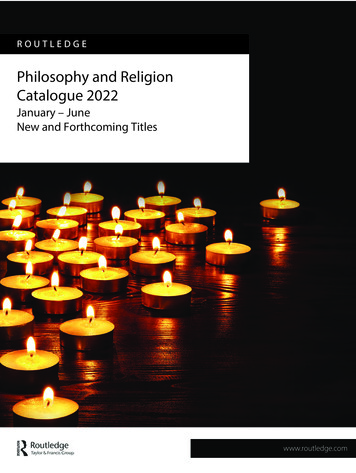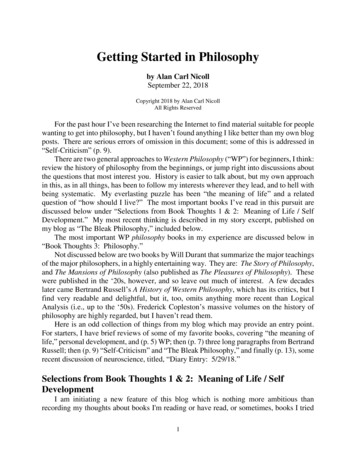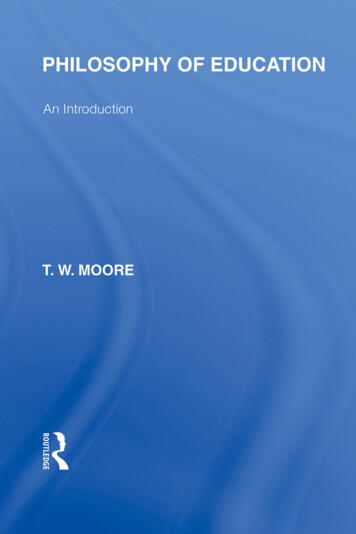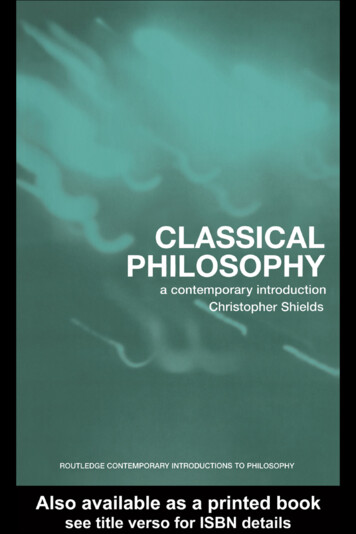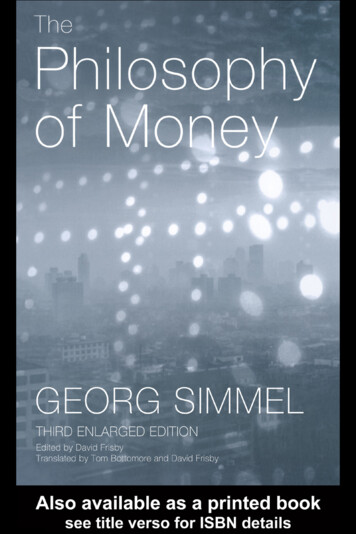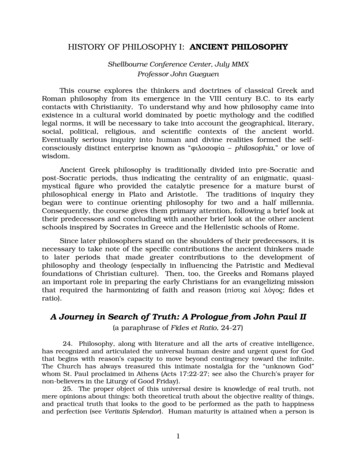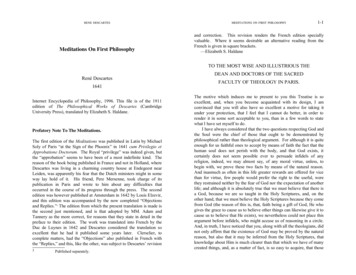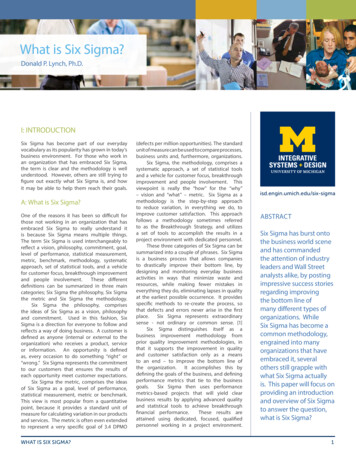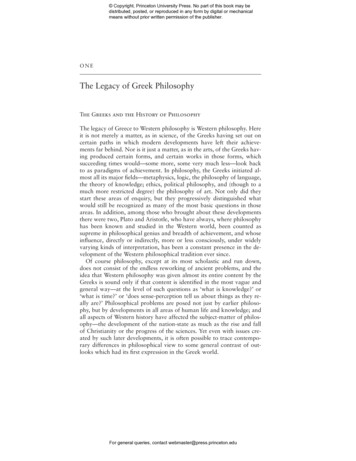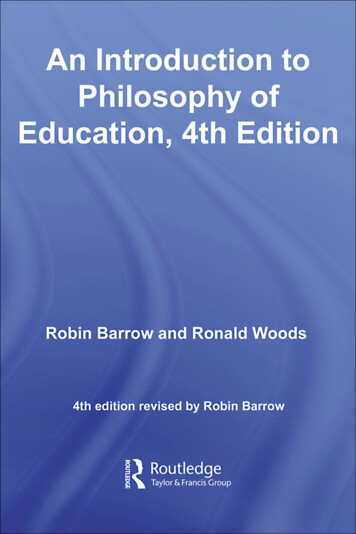
Transcription
An Introduction to Philosophy ofEducation, 4th Edition‘Well written, accessible to students with no previous background in philosophy.an excellent introduction.’The Times Higher Education Supplement (on an earlier edition)What does it mean to be well educated?In the fourth edition of this best-selling textbook, the authors introducestudents to the business of philosophizing, thereby inducting them into theart of reasoning and analysing key concepts in education.This introductory text is a classic in its field. It shows, first and foremost,the importance of philosophy in educational debate and as a background to anypractical activity such as teaching. What is involved in the idea of educating aperson or the idea of educational success? What, if anything, can be known andhow should we organize what we know for curriculum purposes? What are thecriteria for establishing the optimum balance between formal and informalteaching techniques? How trustworthy is educational research? In addition tothese questions, which strike to the heart of the rationale for the educativeprocess as a whole, the authors explore such concepts as culture, creativity,autonomy, indoctrination, needs, interests, and learning by discovery.In this new updated edition, the authors draw on the latest research ingenetics to argue that education is uniquely human and is essentially whatdevelops us as humans. Resisting modern tendencies to equate knowledgewith opinion, and value judgements with taste, this book leads the readerinto the business of philosophizing and champions the cause of reason ineducation.Robin Barrow was previously Reader in Philosophy of Education at theUniversity of Leicester, UK; he is currently Professor of Philosophy ofEducation at Simon Fraser University, British Columbia, Canada where forten years he was also Dean of Education.Ronald Woods was until recently Senior Lecturer in Philosophy ofEducation at the University of Leicester, UK.
Related titlesPhilosophy and Educational PolicyA critical introductionJohn Gingell and Christopher WinchMaking Sense of EducationAn introduction to the philosophy and theory ofeducation and teachingDavid CarrSpirituality, Philosophy and EducationDavid Carr and John HaldaneThe authors are grateful to Educational Philosophy and Theory for permission to make use ofsome material originally published in that journal.
An Introduction toPhilosophy of Education,4th EditionRobin Barrow and Ronald Woods4th edition revised by Robin Barrow
First published in 1975 by Methuen & Co.Second edition 1982Third edition in 1988 by RoutledgeFourth edition published 2006by Routledge2 Park Square, Milton Park, Abingdon, Oxon OX14 4RNSimultaneously published in the USA and Canadaby Routledge270 Madison Ave, New York, NY 10016Routledge is an imprint of the Taylor & Francis Group, an informa business 1975, 1982, 1988, 2006 Robin Barrow and Ronald WoodsThis edition published in the Taylor & Francis e-Library, 2006.“To purchase your own copy of this or any of Taylor & Francis or Routledge’scollection of thousands of eBooks please go to www.eBookstore.tandf.co.uk.”All rights reserved. No part of this book may be reprinted orreproduced or utilised in any form or by any electronic,mechanical, or other means, now known or hereafterinvented, including photocopying and recording, or in anyinformation storage or retrieval system, without permission inwriting from the publishers.British Library Cataloguing in Publication DataA catalogue record for this book is available from the British LibraryLibrary of Congress Cataloging in Publication DataA catalog record for this book has been requestedISBN10: 0–415–38127–4 (hbk)ISBN10: 0–415–38126–6 (pbk)ISBN10: 0–203–96995–2 (ebk)ISBN13: 978–0–415–38127–7 (hbk)ISBN13: 978–0–415–38126–0 (pbk)ISBN13: 978–0–203–96995–3 (ebk)
ContentsPrefaceForewordviixIntroduction11 Thinking about education82 What is it to be human?213 The concept of education264 Knowledge and the curriculum385 Curriculum theory586 Indoctrination707 Rationality848 Self-determination989 The postmodern challenge10910 Needs, interests, and experience11511 Creativity14212 Culture15513 Research into teaching17414 Conclusion: theory and practice185BibliographyIndex192197
PrefacePhilosophers sometimes refer to a ship that needs repairs over the course ofa long voyage, in order to illustrate certain problems or questions aboutidentity. The wooden ship leaves harbour and, while at sea, certain plankshave to be replaced. A short time later some others have to be replaced; afew days after that, some more; and so on, until by the journey’s end all theplanks that went to make up the original ship have been replaced. Is thisthe ship that was originally put to sea or an entirely different one? Whateverthe answer to that question, this book is beginning to resemble that ship.Since the launching of the first edition in 1975 five completely newchapters have been added, one has been thrown overboard, and the remaining text has been subjected to repeated overhaul. Nonetheless, I hope it canbe said that the book remains recognizably the same one that Ron Woodsand I set out to write thirty years ago. That is to say, I hope that it still provides a helpful introduction to the business of philosophizing in the senseof engaging in conceptual analysis and coherent reasoning about education,while providing a plausible answer to some specific educational questionsand establishing at any rate the groundwork of an argument for a particularview of what education is all about and what it therefore demands of us.In this revision, three new chapters entitled, respectively, ‘Thinking aboutEducation’, ‘What is it to be Human?’ and ‘The Postmodern Challenge’have been added. ‘Thinking about Education’ attempts to set the stage bybriefly examining the context in which philosophical thought about education operates, stressing in particular the rational tradition in Westernthought to which philosophical analysis belongs, and the wider concerns ofschooling of which education is merely a part, albeit, it will be argued, themajor part. It seems important also to address the question ‘What is it to beHuman?’ in view of much recent research, particularly in genetics, and inorder to locate education as a peculiarly human activity. It seemed necessary to add the brief chapter on ‘The Postmodern Challenge’ not in order toaddress any theses associated with any particular individuals, but to combatthe stultifying effect of certain propositions, such as that there is no truth or
Prefaceviithat nothing can be known, which, rightly or wrongly, are often classifiedas postmodern in tenor and which, if accepted, would undermine the keyfoundations not only of the positive educational argument of this book butalso of the philosophical activity that it is concerned with. The chapter on‘Understanding’ of previous editions has been dropped, not because we donot continue to believe that education is primarily and essentially aboutunderstanding, but because a great deal of the overall text is concerneddirectly and indirectly with issues to do with understanding and knowledge,and, given a need to cut something at the publishers’ behest, it was felt thata direct examination of what ‘understanding’ means could be foregone.Beyond these major changes, the bibliography has been brought up to dateand the remaining text has been subjected to various fairly minor revisionsand one or two paragraph length additions.I should like to conclude with a comment on the updating of referencesand examples. I have, by and large, attempted to bring specific examples of,for example, films up to date, so that the ‘Straw Dogs’ of 1975, whichbecame ‘The Texas Chainsaw Massacre’ of 1988, now becomes ‘Crash’.This is simply to help the majority of readers recognize the reference! Andthough, for example, a few references to the game of Bingo are retained,because as a matter of fact for a period educational philosophers used it asan iconic example and argued about its specifically educational potential,most of them have been replaced by reference to, for example, video-games,since clearly it is the latter that represent a potential challenge to educationtoday rather than Bingo. But, and this is important, by and large the philosophical references – the author cited, the arguments explored – have notbeen changed.A very minor reason for this is that after discussion with the publisher itwas agreed to produce a new edition of this work rather than a new introduction to philosophy of education altogether, since, strange as it may be,this book has proven itself capable of weathering changes of fashion andfocus over time. If all the topics and the arguments relating to them hadbeen brought up to date, drawing on new material written exclusively in thelast ten years, then clearly it would not have been a new edition; it wouldhave been a new book – a different ship.A major reason is related to the original aim of the book: to introduce thebusiness of philosophizing about education. To that end, provided the examples are not so foreign as to be incomprehensible to the reader, it reallydoesn’t matter what issues, what authors, or what arguments one uses, sincethe primary purpose is to illustrate philosophy in action and to have material on which to practice (i.e. get thinking). That reason would be sufficientto justify continuing to examine, for example, Peters’ work on the conceptof education or Hirst’s work on forms of knowledge. Indeed, in the lattercase, Hirst himself, if he hasn’t actually repudiated his original thesis, has
viiiPrefacecertainly moved way beyond it. But that does not stop it still being anintriguing and persuasive thesis, and one which may serve as an excellentway of introducing the question of the nature of knowledge and the significance of the question for curriculum.But sufficient though that reason alone would be, I must in honesty addone more. While philosophy of education continues to thrive, not verymuch has been done in recent years that really adds to the primary analyticwork done thirty to forty years ago, at least at a basic level. If I look at arecent issue of the Journal of Philosophy of Education, for example, I seea number of excellent articles, but none of them speak to the issues in thisbook. This is not to set the stage for a confrontation between different typesand styles of philosophy. It is simply to say that this book is predicated onthe belief that it is desirable that all teachers and educators should recognize the importance of, and become reasonably adept at, analysing the keyconcepts in education; that, and secondarily suggesting a particular view ofwhat such analysis leads us to recognize as genuinely educational, is whatthis book is about, and most of the work focused on that was indeed donesome years ago. Does this make the book old fashioned? No. This –analysing the key educational concepts – is something that each generationhas to do for itself anew.Robin BarrowVancouver2005
ForewordThis Foreword consists of the Prefaces to the second and third editions,which are retained largely for historical reasons. Apart from registeringwhen various specific changes and additions were made, they provide arecord of the continual debate among philosophers as to the precise natureof analysis, and remind us of the constant need for those who are committedto the view of rationality that underpins this book to defend it against thosewho, however incoherently, seem to question it, whether in the name ofrelativism, nihilism, Marxism, sociology of knowledge, or postmodernism.Preface to second editionThe invitation from our publishers to update and revise our Introduction toPhilosophy of Education gives rise to the question of the nature of philosophy, for it is not the kind of subject that dates in the way that physics or evenhistory may do. There are revolutionary thinkers in philosophy who openup entirely new paths of inquiry, but they are exceedingly rare, and eventhey do not often falsify the past so much as move away from it. Philosophyis less about generating knowledge of new matters than about providinggreater understanding of what we are already familiar with. Seldom arethere new discoveries or new interpretations that make previous work in thefield unacceptable. What, for example, Plato had to say about love or justice over two thousand years ago has not been invalidated, replaced, or rendered obsolete by the work, of, say Wittgenstein in the last century. Plato’swritings really do have as much pertinence today to the questions withwhich they are concerned as any contemporary work, in a way that the writings of early Greek doctors or scientists, for all their intrinsic interest, donot. There can of course be specific criticism in philosophy that showsarguments thought to have been sound to be untenable, but that kind of shiftof view scarcely applies at the level of an introductory text.Out initial aim was to provide an introduction to the business ofphilosophizing in the context of educational problems; in line with that aim
xForewordwe concentrated on pursuing an examination of the main concepts in thedomain of education (or, as I should now prefer to say, schooling, since Itake education to be merely one of many possible concerns of school,although most of the topics treated here are to do with the more specificconcept of education). The intention was to conduct a rigorous investigationof the ideas of education, knowledge, culture, etc., so that a fuller picture ofthem and a greater awareness of the implications of each concept wouldemerge, or sometimes, so that the inadequacy of an idea or slogan might beexposed. In so far as what we originally wrote was to the point andcoherent, the passing of time – at any rate, so brief a period of time – doesnot much affect it. If there was the logical possibility of distinguishingbetween influence generally and indoctrination specifically five years ago,there will be still. If our conception of education involved knowledge andunderstanding then, it does now in all probability. If the creativity of aBeethoven was distinct from the self-expression of a young child last year,there will be good reason to maintain that distinction this year. So, in designand broad outline this edition retains the format and flavour of the first, notbecause we are complacent, but because material changes in the world donot often affect conceptual truths and points of logic.None the less some changes have been made. First, there are a number ofsmall but not insignificant stylistic alterations; and a number ofgrammatical infelicities have been corrected. Allusions and references havein many places been brought up to date: nothing dates quite as obviously asthe name of a defunct pop group or a forgotten political event. Examples,too, have sometimes been brought up to date, although here again it must beremembered that the function of examples in philosophy is very often suchthat neither their being up to date nor their practical likelihood matters verymuch. For instance, when a philosopher considers whether a historian whoknows nothing other than history should be considered as educated, he isnot interested in the likelihood of there actually being such a person, but inwhether, if there was, he would count as educated. He is interested in whatmight intelligibly be conceived, more than in what happens to be the casein the physical world. It is important to realize at the outset that examplesare used for the purpose of testing logical possibilities rather than actualprobabilities in order to avoid the mistake of assuming that philosophers areout of touch with the everyday world. When we ask whether a person couldbe in two places at the same time, we are not questioning the possibility ofa physical body such as yours or mine being entirely in Oxford while alsobeing entirely in Cambridge; rather we are raising the question of the sensesin which a person might conceivably be said to be in two places at the sametime. (Suppose your body minus your heart is in Oxford, but your heart iskeeping another body alive in Cambridge.) In other words we are reallyraising the question of what constitutes being a person, and not asking
Forewordxiabout material factors in the everyday world at all. When we ask whetheran individual could be considered creative if he were to spill paintaccidentally onto canvas in such a way as to produce a beautiful pattern, weare not concerned with whether anyone has done or might do such a thing,but with throwing light on what is involved in the notion of being creative.(Again, if someone did that, would we classify it as a creative act?)Likewise, nobody that I know of would behave in some of the ways used asexamples in the chapter on rationality in this book, but to considerexamples, however bizarre, allows us to fill in the details of, or to question,our conceptions. (Incidentally, one reference that I have not bothered toupdate is that made to the launching of the first sputniks. It is true that somereaders may not have heard of sputniks, but in terms of technologicalbreakthrough, which is the point of the reference, some of the early steps inthe space race represent more significant achievements than later, moredramatic steps. For that reason the example does not need bringing up todate, and for that reason younger readers ought to be presented with it.)Once or twice changes in our own thinking brought about by thought anddiscussion and with the passing of time have necessitated alterations to thesubstance of an argument. Or issues to which we were not previously alert,such as the widespread immoral treatment of animals, have impinged on ourconsciences and required a mention. However, such changes in substantivecontent are not extensive, if only because, while the original text was thework of two of us, this revision has been solely my responsibility.The main weakness of the original edition, in my view, was that we didnot draw a very clear distinction between words and concepts or betweenverbal and conceptual analysis. More simply, we did not, perhaps, make itentirely clear what we took philosophical analysis to involve. In particular,we made a number of references to ‘linguistic usage’ and to ‘objectivity’and ‘correctness’, without making it clear to what extent linguistic usagedetermines conceptual meaning (as opposed to reflects it, coincides with it,influences it, etc.), and without explaining in what senses of the words ananalysis can be said to be ‘objective’ and/or ‘correct’. On this broad butvitally important matter of methodology Woods and I have, we think,slightly different views although we have never satisfactorily resolvedwherein the difference lies. This may partially explain the slight vagueness,not to say odd sign of tension, about our procedure in the previous edition.I have argued extensively elsewhere that although there are a number ofvery important questions to be asked about verbal matters ( the features andfunctions of words and our use of them), it is important to distinguish themfrom conceptual questions.1 Questions about linguistic usage may lead toilluminating answers of direct relevance to conceptual issues, and shouldtherefore be asked by philosophers. But none the less they are distinct fromquestions about concepts as such, and should therefore not be the
xiiForewordphilosopher’s only interest. As words and concepts are not identical, solinguistic analysis cannot be coextensive with conceptual analysis. We may askhow people tend to use the word ‘educated’ and that will certainly throw lightupon what is generally involved in being educated, at any rate as conceived byour culture. We may find that all people use the term in exactly the same away,or we may find that, despite variations, there is a common core to all uses ofthe word. Consequently we might, if we chose, talk of a correct or objectivesense of the word ‘educated’ (i.e. the sense of the word sanctioned by usage inour culture). But such linguistic exercises, though they may in some casesincidentally reveal all that there is to be said about the concept behind the word(the idea behind the label), do not necessarily do so, and in fact are less likelyto do so in proportion to the complexity and sophistication of the idea inquestion. Two problems, at least, may very likely remain – problems that needtackling and which very obviously belong to the domain of philosophy: peoplemay use a word in widely different ways, sometimes to the point at which theredoes not appear to be even a common core, and people’s use of a term may failto reveal a clear and coherent conception on its own terms. Thus ‘educated’might conceivably mean something quite different for two people (in whichcase we are dealing with distinct concepts labelled with the same word), andanybody’s notion of being educated, including one’s own, might just beinsufficiently clarified and worked out. I should be strongly inclined toconclude that talk of a correct or objective concept is therefore meaningless,unless one merely means a widely shared concept. One may reasonably askwhether my use of the word ‘educated’ is correct according to standardpractice in my culture, but the question to ask about my concept of beingeducated is how well formulated or articulated it is.The task of the philosopher, having taken what hints and clues he canfrom linguistic patterns, is to arrive at a set of clear, coherent, and specificconcepts. We need to clarify our concepts in order to asses them; until wepainstakingly spell out what we understand by being educated we can saynothing about it, and obviously our unpacking must lead to a clearexposition, so we know that we are saying something and what it is.Coherence is necessary, both within and between concepts, so that our ideasmake sense and can stand up: we do not want a conception of beingeducated that when clearly articulated turns out to be self-contradictory orto carry with it implications that we cannot for one reason or anotheraccept. Specificity is necessary in order to facilitate talk with teeth in it.That is to say, in order to be able to make telling comments on the world, inorder to gain a fuller understanding, one needs to develop an armoury ofspecific as opposed to general concepts. The ability to discriminate betweenthe various species of a genus, in any field, rather than to see the world onlyin terms of genera, represents power when it comes to knowledge.2
ForewordxiiiIn line with the distinction referred to between words and concepts, thedevice of using quotation marks round single words or phrases, ratheroverworked in the first edition and not adopted consistently, has here beensystematized. When the word is being referred to, quotation marks are used;when the concept is being referred to, they are not used. Thus we discuss thelogical features of knowledge, but the emotive force of the word ‘knowledge’.Occasionally quotation marks are also used as ‘sneer quotes’ to suggest anironic or otherwise not quite literal use of a word or phrase.Another change I considered was that of replacing the generic use of theword ‘he’ (to mean ‘a person’) by ‘she’ or by some newly coined neutralterm. But I rejected this in the end on the grounds that correct Englishprovides us with the word ‘he’ meaning ‘a person of either sex’, and itwould be more appropriate for the few who do not appreciate this to learnit, than for the rest of us to devise new terminology. To replace ‘he’ by ‘she’,as some authors now do, seems the worst of all worlds and a good exampleof the incoherence of what is sometimes termed ‘reverse discrimination’. If‘he’ were an immoral or otherwise unacceptable usage, then so must the useof ‘she’ be immoral, as well as incorrect.3One or two additional comments, sometimes substantive, have beenmade, but economic factors have necessitated that most of them be addedas notes at the end of the chapter in question.But what, the novice may ask, about the effect of recent currents ofthought and shifts of ideology and perspective? Marxism, for instance, hasmade great inroads in the philosophy of education in Australia since thisbook was first written. In Britain in the same period interest inphenomenology and existentialism has increased. In the study of educationa number of sociological critiques have tried to suggest that the type ofphilosophy here practised is just one more class-based act of specialpleading. Should not these and other similar tides of thought be reflected insome way in a new edition? The simple answer is, no. The variousmovements, ideologies, and methodological critiques that come and go areattempts to interpret the world in one particular way. They are therefore tobe contrasted with, rather than opposed to, a book such as this which doesnot seek to explain the whole field of education, let alone the world orhuman experience, but to contribute to a greater understanding of someideas and arguments related to education.4Of course some work in other fields does suggest criticism of ourmethodology. Some, for instance, have argued, though quite unconvincingly,that knowledge is a purely social construct, and that our attempt to bedetached and objective is necessarily but one more socially determined pose.Others, more reasonably, have made points to the effect that our procedureis in various ways less value neutral than we might wish. These latter kinds
xiv Forewordof criticism, involving argument directly related to certain practices orassumptions, are fair comment and, in so far as they are convincinglyargued, to be taken note of. But a general sociological thesis, presentedwithout reference to the arguments of particular philosophers, to the effectthat the would-be autonomous and independent-minded philosopher isactually inevitably the product of his social environment, no more requiresa philosophical rejoinder or the abandonment of philosophical practice,than a Freudian account of why an individual seeks love in the ways he doesobliges the lover to start loving in a new way. It is, incidentally, mostunfortunate that, given this quite common tendency to fail to see thedifference between sociological attempts to explain, psychological types ofexplanation, philosophical inquiry, and historical accounts of events, andthe consequent tendency to believe any one of them to be more significantthan it is, we have for the most part failed to institutionalize the study of atleast these four subjects as crucial to the study of education. Had we done sowith more success there might be fewer people around who believe that toexplain why somebody believes something in sociological terms is todispense with the question of whether the belief is reasonable. (At theUniversity of Leicester, while preaching the importance of the disciplines,we have in fact moved from requiring students to study all four ten yearsago, through a period of requiring that they study only one, to a state inwhich they study two. This is to be welcomed, I suppose, on the grounds thathalf a loaf is better than none. But the adage is misleading. When the pointof the exercise is to develop in people a capacity to recognize logicallydifferent aspects of a matter, giving people awareness of only half thepossibilities is more like giving them half a sixpence than half a loaf.)It was, then, never the purpose of philosophy (our conception of it, that is)or a book such as this to offer to interpret the world. Its aim was, and remains,‘to attempt to show philosophy in action’ with ‘the stress on how to dophilosophy’. For this reason it is of secondary importance what particularconcepts and arguments are focused upon. We might have elected to addchapters on topical themes, but to have done so would only have been toreduplicate work done elsewhere. As to the original issues we chose to discuss,it is difficult to see how a philosopher of education could not but throw out atleast passing reference to education, understanding, and knowledge, and westill believe that rationality, culture, creativity, indoctrination, and the notionsof readiness, discovery, needs, and wants (collected together in Chapter 10),deserve to be carefully considered by any prospective teacher.Robin BarrowUniversity of Leicester1982
ForewordxvNotes1 See in particular my The Philosophy of Schooling and ‘Five Commandments forthe Eighties’ in Educational Analysis, ed. Barrow, R. vol. 4, no. 1, 1982.2 See Barrow, R., Injustice, Inequality and Ethics (Brighton, Wheatsheaf, 1982)ch. 1.3 On this topic, see further Barrow, R., op. cit. [For the third edition I have left thisparagraph and left the generic ‘he’ in the body of the text. I regonize, however,that, rightly or wrongly, I am likely to lose this argument in practice, in thelong run.]4 [But note, since these words were first written, a recent review of the author’sCritical Dictionary of Educational Concepts, which refers to an ‘individualisticlack of interest in the social dimension’. Times Higher Education Supplement,29 May 1987.]Preface to third editionIn the Preface to the second edition of this book I wrote ‘At the Universityof Leicester, while preaching the importance of the [foundation] disciplines, we have in fact moved from requiring students to study all four [philosophy, psychology, history, and sociology] . . . , through a period ofrequiring that they study only one, to a state in which they study two.’ Timepasses, and now Leicester, in common with many other departments of education, requires nothing in the way of disciplined academic study. Indeed,both Ron Woods and myself, in common with other theoretically inclinededucationalists, have now left the University of Leicester, nor is it likelythat we will be replaced.That, as some readers may appreciate, is about par for the course. It isparticularly gratifying, t
Making Sense of Education An introduction to the philosophy and theory of education and teaching David Carr Spirituality, Philosophy and Education David Carr and John Haldane The authors are grateful to Educational Philosophy and Theory for permission to make u

